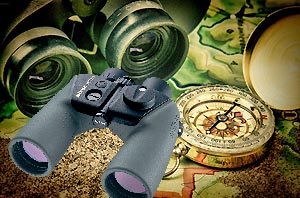Best Rated Compass & Rangefinder Binoculars | Marine | Comparison and Reviews 2023
April 22, 2023 by SmartReview
Filed under Best Rated Binoculars

![]()

Compass & Rangefinder Binoculars
If the binoculars have a rangefinder, then you can get your range from an object as well. Most compass binoculars have an illuminated compass for night use. They are best suited for boating and marine,and hunting purposes. All of those listed are Waterproof & Fogproof binoculars. The binoculars are filled with Nitrogen or Argon gas to help prevent fogging. Below are the top rated binoculars to compare by features, price and reviews.
(best rated compass binoculars by consumer reviews)
| Nikon Oceanpro (7x50mm) Compass Binoculars (16026) | Fujinon Mariner (7x50mm) WPC-XL Compass Binoculars | Bushnell Marine (7x50mm) Compass Binoculars 137500 | Steiner Marine Navigator Pro (7x50mm) Compass Binoculars |
| Is this the best price? | Is this the best price? | Is this the best price? | Is this the best price? |
| 7×50 Illuminated Compass Waterproof & Fogproof Apparent field of view 50.4° Porro Prism System Closest focus: 33 ft Eye Relief: 22.7mm Exit Pupil: 7.1mm Weight 39.5oz 25 yr. Warranty | 7×50 Illuminated Compass Waterproof & Fogproof Apparent field of view 50.0° Porro Prism System Closest focus: n/a Eye Relief: 18mm Exit Pupil: 7.1mm Weight 31.9 oz 5 yr. Warranty | 7×50 Illuminated Compass Waterproof & Fogproof Apparent field of view 50.0° Porro Prism System Closest focus: n/a Eye Relief: 18mm Exit Pupil: 7.1mm Weight 37 oz Lifetime Warranty | 7×50 Illuminated Compass Waterproof & Fogproof Apparent field of view: 49.7° Porro Prism System Closest focus: n/a Eye Relief: n/a Exit Pupil: n/a Weight 39.6 oz Lifetime Warranty |
| | |||
| Binoculars Glossary of Terms |
| Closest Focus Distance = This is the nearest object that you can focus on. Lower power binoculars can focus on closer objects than high power binoculars. Apparent field of view = Apparent field of view is the angular diameter, expressed in degrees (°), of the circle of light that the eye sees through your binoculars. A large field of view is good for a seeing a large amount of area (usually with lower power binoculars). Higher power binoculars zoom in on a smaller area. Eye Relief = Eye relief is the distance (in millimeters) that a binocular can be held from your eye and the full field of view can still be observed. More Eye relief distance is important for those that wear eyeglasses. Apparent Field of View = This refers to how much of the overall scene you can view. The higher the magnification, the smaller field of view. Just like a wide angle lens will show more of the view, a lower magnification binoculars will show more of the overall scene. A higher magnification will show a closeup view, but with a much narrower field of view. The field of view is measured in degrees. A 180 degree field of view is being able to view everything in front of you. Ultra Low Dispersion (UD) Lens = Some of Canon’s high end Waterproof Binoculars have a superior UD Lens. These type of lenses will reduce chromatic aberration, or color fringing, which can affect the image by reducing contrast, and image sharpness. Nitrogen or Argon Filled = Filling binoculars with Nitrogen or Argon helps to prevent fogging. ED Glass Elements = Nikon’s Monarch Series binoculars have ED Glass (Extra-low Dispersion) glass lenses, which correct chromatic aberrations across the furthest limits of the visible light range and effectively compensate for color fringing. The improved resolution also provides brighter, more natural looking images. Roof Prism System = Roof prism binoculars have a straight profile, with the eyepiece situated directly behind the front lens. This allows for a more compact design. Porro Prism System = Porro prisms are what traditional binoculars have used. These type of prisms do not need extra coatings to have the same light transmission as Roof type prisms. |
Related Article: Best Rated Image Stabilized Binoculars – Comparison & Reviews
Related Article: Smart-Review Binoculars Buying Guide
